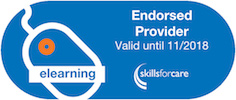Common Inductions Standards for Care Level 2 (VTQ)

Common Inductions Standards for Care Level 2 (VTQ) at a glance
- 1-year nationally recognised certificate
- 6 hours and 21 minutes of engaging video training
- Video access for 8 months
- Printable wall certificate
- Free weekly video refresher
THIS COURSE HAS BEEN REPLACED BY THE CARE CERTIFICATE TO COMPLETE THE KNOWLEDGE COMPONENTS OF THE CARE CERTIFICATE PLEASE VISIT OUR CARE CERTIFICATE ONLINE COURSE
We have been recognised as an endorsed provider from Skills for Care, earning the prestigious distinction as a Centre of Excellence within training and health & social care.
Induction training in the care sector provides a valuable start to care, workers, new jobs. The problem has been to have a course that covers enough content to meet the standards in a flexible format. This ProTrainings course covers the eight standards using informative videos and when used within work training and experience you can easily meet these standards.
Since 2010 the Common Induction Standards (CIS) have been a key part of the early training for all adult social care staff. The CIS 2010 replaced the CIS of 2005. The CIS is to be completed before or within 12 weeks from the start of the employment by the employee and they include several key areas. This course can be completed in one sitting or over a period of time nationally through our approved and monitored national network of instructors. Care managers need to ensure that employees have met all the standards.
We have built a classroom course and soon a video online course to meet these requirements for employees. The eight common induction standards are:
- Standard 1 - Role of the health and social care worker
- Standard 2 - Personal development
- Standard 3 - Communicate effectively
- Standard 4 - Equality and Inclusion
- Standard 5 - Principles for implementing duty of care
- Standard 6 - Principles of safeguarding in health and social care
- Standard 7 - Person centres support
- Standard 8 - Health & Safety in an adult social care setting
This qualification and most of the other ProTrainings qualifications are Endorsed by TQUK to show our commitment to extra levels of compliance and quality assurance.
Companies, organisations or agencies are encouraged to contact us for group discounts and information about onsite training and how our system can be used to track and monitor your staff training.







